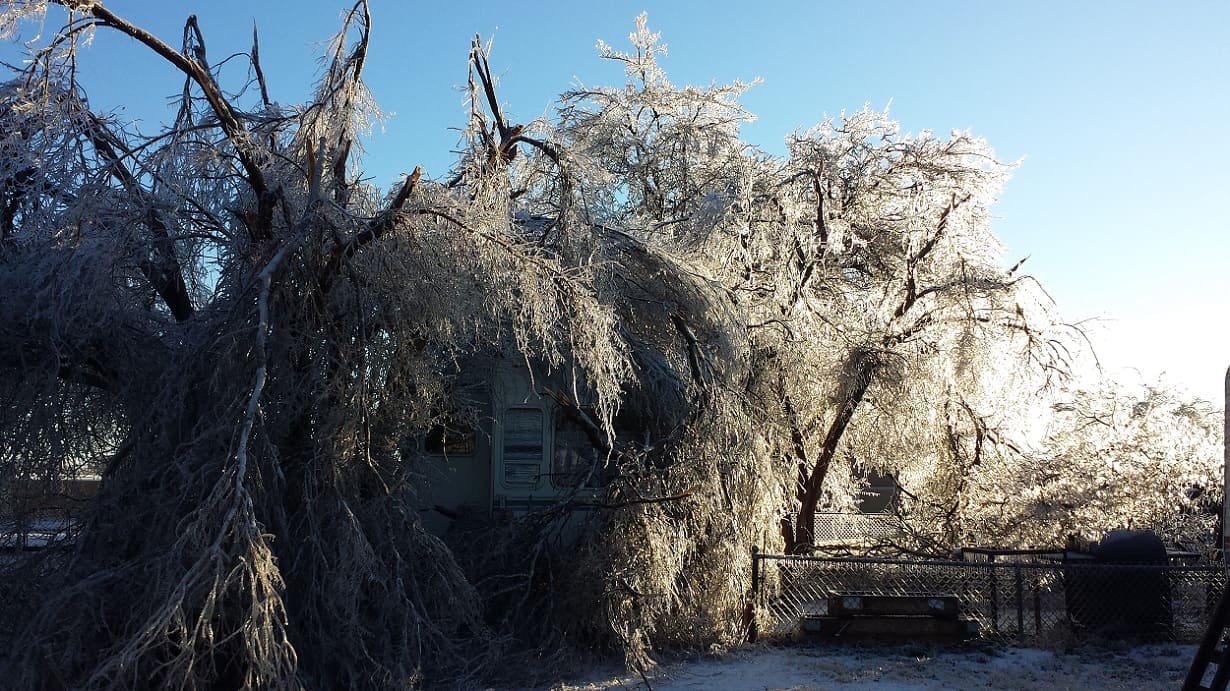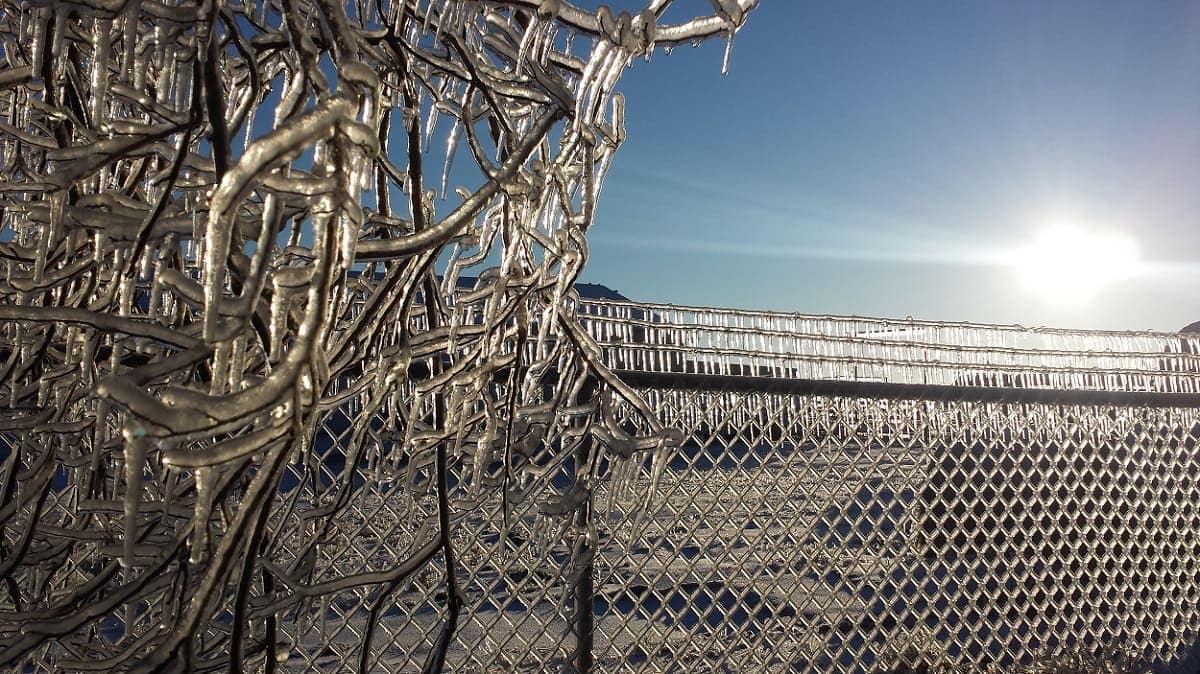
I grew up in a household of scouts, and the motto Be Prepared was ingrained in me early. My dad was a Boy Scout Leader, my mom was a Girl Scout Leader, and all three of us girls were in Girl Scouts at various times. I was properly pegged 10 years ago, when I pulled my Swiss Army knife out of my purse to cut a tag off a jacket that had been gifted to a member during Sunday morning church service. I’ve cooked on grills and white gas camping stoves during long power outages, and even loaned out my lantern to a coworker who couldn’t use candles (we could).
So last week, when an ice storm was forecast for our area, I wasn’t too concerned.
The tank for our well had been replaced this summer, and the forecasts gave my husband the nudge he needed to go out and wrap the pipes and the tank several days ahead. He did complain that he needed some different insulation for a T pipe that the regulator was on. He also turned the heat on in a friends’ RV here in our yard and set the heater low, just in case there was residual water in the lines. Having had the pipes under the house freeze before when temps dropped below freezing for more than twelve hours, I turned the kitchen faucet on to drip. And we went to bed.
The ice came, and a dusting of snow, and temperatures in the low twenties. It wasn’t nearly as bad as the New Year’s storm in the pictures. But when we woke up, there was no water.
What happened?
“Did you leave the water running?” my husband asked.
“I think so, but having checked all the faucets just now, I can’t guarantee it,” I replied.
Once it was light enough to see, my husband went out to the well to see if it was still on. Oops — he’d forgotten to get the insulation on the T to the regulator. We still had power, so he put a heat lamp on that, and I headed to the store for a couple of 5-gallon jugs of water.
Even though temperatures never got above freezing that day, the pipe was thawed by 11:00 am and we had water. And yes, he got it wrapped!
We went about our tasks for the day, and since I was cleaning house, I put off my shower until evening. He got his first, and I had just stripped for mine when the lights flickered. Once, twice, three times, and then they were gone. At least I hadn’t gotten wet yet!
The electric outage line predicted it would be back at 11:30 pm — a 3+ hour wait.
When the lights first went out, we each grabbed a flashlight, and I started lighting candles. We got the text about the projected “on” time and began to debate: do we stay up or go to bed? Get the generator out or wait? While we talked, I filled three oil lamps and placed them around the house.
About 10:00 pm, we decided to try to go to bed, knowing the lights coming back on would wake me for sure, and gambling that it would be on before needing to put the refrigerator on the generator. I blew out the candles, turned the lamps low, and we turned in. At 10:43 pm the power came back on.
Looking back the next day, I analyzed the situation. Were we prepared? Yes and no.
- Knowing we were on a well and vulnerable to both freezing lines and power outages, I should have already had the big water jugs on hand. We had plenty of drinking water, but toilets use a lot!
- My husband should have double-checked the well. On his behalf, he had done the work 3 days ahead and was on the phone during the whole time trying to track down a job, so he had a good excuse to be distracted. Knowing that, I would have been in line to ask him if he’d finished, and I didn’t.
- We had plenty of food and drinking water, warm clothes and extra blankets.
- We had the generator available if needed, and it was fully fueled.
- I discovered that I need to get a different kind of fuel for my lamps. The lamp oil I have isn’t clean burning and aggravates my asthma. My husband suggested kerosene, but even K1 can cause trouble for sensitive people. After research the next day, I learned there is a kerosene substitute that is highly rated, as is the Aladdin brand oil. I’ll get some and see what works best for me. Most of my lamps will also need new wicks, having been used with colored and scented oils prior to coming into my possession. (Those kinds of fuels can cause them to stiffen and clog, preventing them from wicking properly.)
Amazingly, there are plenty of people who don’t have even those basics. I spoke with one neighbor the next day after the power outage, and he didn’t have anything but the light on his cell phone!
Granted, candles and other sources of live flame aren’t great for everyone. But with just two of us, we have 5 flashlights in the house (each side of the bed, my office, two in the kitchen), one in each vehicle, and I believe he has one in his shop as well. There are also plenty of battery powered candles and lanterns out there for people with kids, pets and folks apt to knock things around. Craft stores are great for the candles, and sporting goods and hardware stores carry the lanterns. I buy the big packs of batteries whenever they are on sale. Cheap insurance.
Our little event was nothing compared to the folks evacuating from wildfires and hurricanes. But I was reminded that it’s easy to get complacent. We both assumed we were ready, without sitting down to think it through and verify.
What about you? Everyone is in a different situation, but we can all face emergencies. Are you ready for an evacuation, or to be without power for 6 hours or more? (Whatever is appropriate for your location.) Do you have children or others in your household who need extra assistance? Have you talked to your family about what to do and shown them where to find flashlights, batteries and such if you aren’t there?
Everyone should have an evacuation plan from the house or apartment, and if you are in an area vulnerable to fire or flood, a plan to evacuate the neighborhood. Even better, you should all practice what to do in case of a fire, or evacuation, or just a power outage. Yes, even you single adults! Why?
When you are in an emergency, you want to be confident that you know what to do. Emotions and adrenaline run high, and it’s hard to think logically, but if you have practiced finding things in the dark, getting out of the building or whatever, that will help you break through the emotional block and move. It can save your life.
If you aren’t sure where to start planning, an excellent place to visit is the Red Cross. They have everything from planning tools to go-bag suggestions. Some other good sources are AARP’s The New Go Bag: What You Need in Your Emergency Escape Kit and usa.gov’s Emergency and Disaster Preparedness. Of course, there are plenty of sites that want to sell you preparedness kits, whether you want something for your car or are planning to go off-grid for the zombie apocalypse!
If 2020 has shown us nothing else, we have seen that life is full of surprises. It’s time to show ourselves that we have learned a few things along the way, and that there are things we can do.
Be Prepared!

Grace, Peace and Hugs!